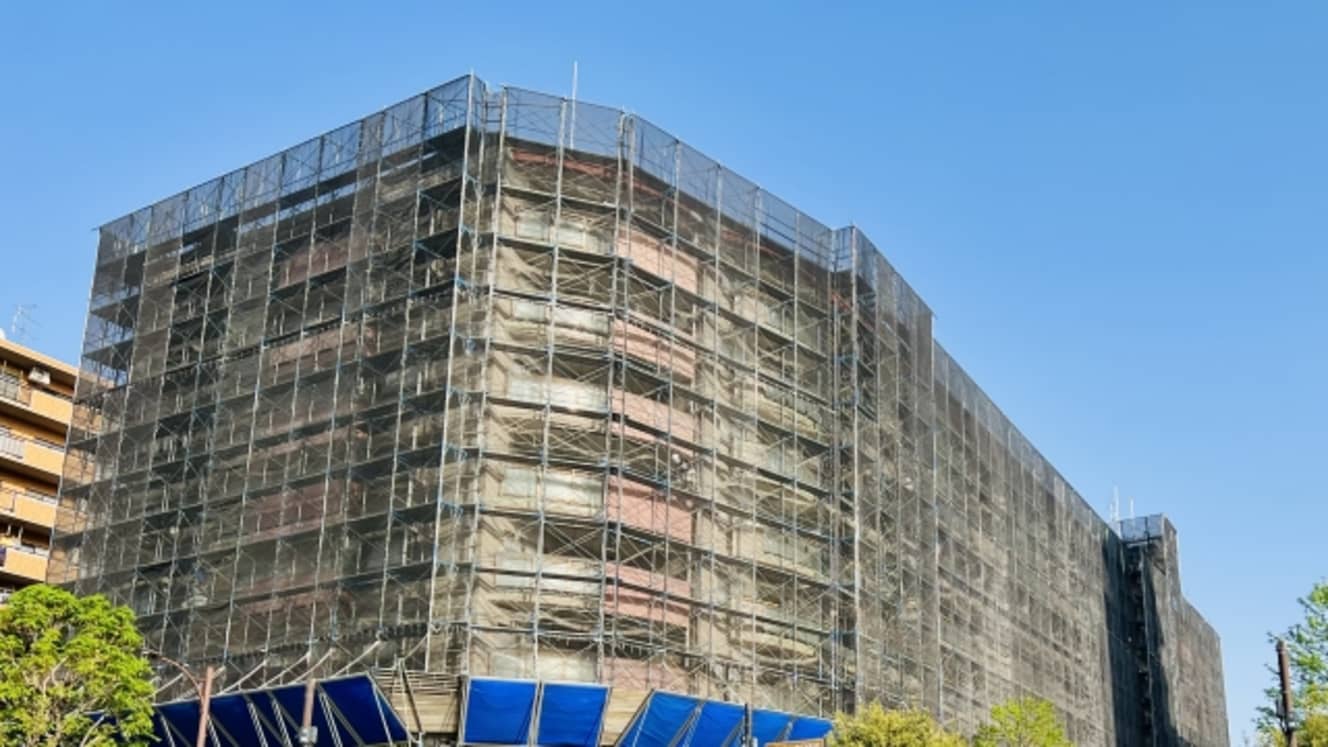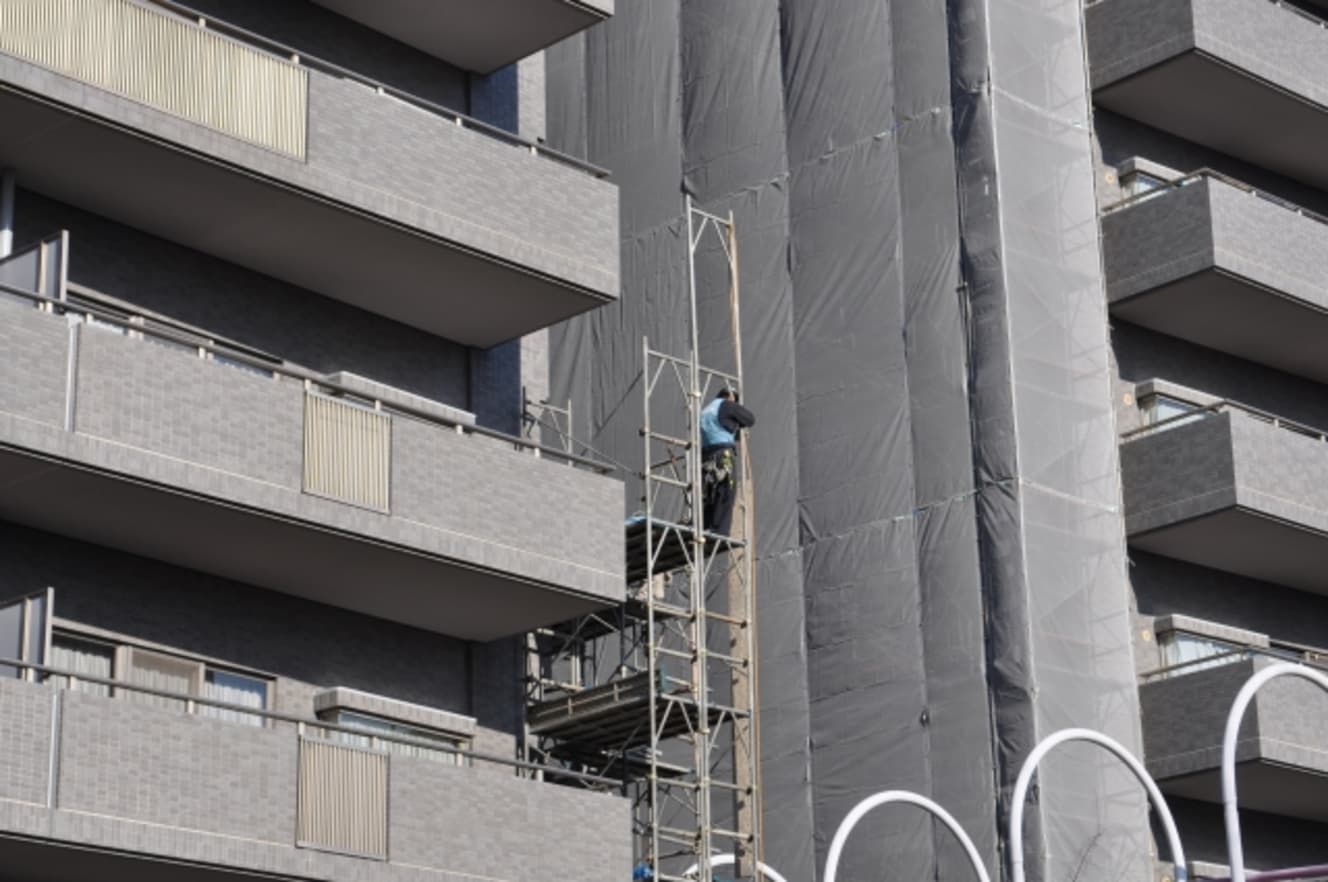Everyone in the industry knows about it.” “Collusion” in large-scale condominium repair? …Why the JFTC on-site inspection?
Condo management company ripping you off? It was taboo to speak out on this subject.
Large-scale repairs are a common occurrence in condominiums, but if collusion was rampant there and the construction cost was 20% higher than it should have been, …… would have been a very real possibility. Such a story has emerged as a reality.
On March 4, the Fair Trade Commission conducted on-site inspections of about 20 construction companies on suspicion of bid-rigging in the large-scale repair of condominiums, in violation of the Antimonopoly Law (unfair restriction of trade), major newspapers and other media reported. It is believed that this practice has been in place for many years.

In large-scale repair work on condominiums, when the residents and other members of the management association select a contractor, they generally consult with several contractors to obtain estimates and choose the one with the lowest construction cost.
However, there are many contractors and they need to have specialized knowledge, so it is sometimes difficult for the condominium management association itself, which is mainly composed of residents, to select a candidate contractor. Therefore, some management associations often ask condominium management companies or real estate/design consultants to help them select a contractor for repair work.
According to a series of media reports, it is suspected that the contractors who were shortlisted for the repair work made prior adjustments to the price of the work and to the contractors when they were meeting for quotations and bidding, thereby unfairly raising the cost of the work.
A person with knowledge of the situation responded to FRIDAY Digital on condition of anonymity and admitted that the reports are generally true. According to the person, the case involves the collusion of about 20 companies that were selected as candidates for large-scale repairs by the management associations of condominiums in several locations in the Kanto region. Subsequent newspaper reports indicated that the JFTC was also investigating several design consultants.
Article 3 of the Antimonopoly Law prohibits private monopolies and unreasonable restraint of trade. In this case, it is suspected that the company had decided in advance which companies would receive orders, which could be considered an unfair restriction of trade.
The time has finally come. It took a long time.
Teruyuki Tsuchiya, a condominium management consultant with the real estate consulting firm Sakura Office (Shibuya Ward, Tokyo), said, “It took a long time.
Tsuchiya has been sounding the alarm for years that collusion is rampant in the large-scale repair of condominiums. However, this is the first time that the authorities have taken action to uncover collusion in the large-scale repair of condominiums.
In the large-scale repair of condominiums, this (bid-rigging) is a well-known fact. Everyone in the industry knows about it, but it has been taboo to speak out.
In selecting contractors for large-scale repair work on condominiums, management companies and real estate/design consultants sometimes diagnose the deterioration of the building in advance to determine what repairs will be needed.
When Mr. Tsuchiya visited the management association of one condominium prior to a large-scale repair, a person in charge of a subcontractor of the condominium management company was wearing the uniform of a “management company” and diagnosing the deterioration of the building. Later, when I visited another condominium, the same person who had been diagnosing the deterioration of the building was now working as an employee of the “construction company” on repair work.
In other words, in the earlier condominium, the management association commissioned the condominium management company to provide consulting services to select a contractor for the repair work, but the contractor was selected before the management association received quotes from the various companies. In fact, that contractor ultimately accepted the work. It is a farcical story.
Back Margin” due to Collusive Bidding: 10-20%?
Regarding “joint quotations,” in which condominium management associations obtain quotations from multiple contractors for large-scale repairs, Tsuchiya says, “Even when three or four companies submit joint quotations, the contractors scheduled to perform the work are decided through collusion, and the materials submitted by each company are sometimes all prepared by the contractors scheduled to perform the work. In some cases, the materials submitted by the companies are all made by the prospective contractors,” he added. It is the same way as government collusion,” he said. This is the nature of the industry, and it is rampant.
Tsuchiya estimates that the “back margin” from such bid-rigging is 10 to 20%, and that the cost of major repairs for a 50-unit condominium is often 1.5 to 1.7 million yen per unit, or more than 300,000 yen if 20% of that amount is used.

About 40 years ago, a representative of a condominium management company with whom Mr. Tsuchiya had a business relationship told him, “Large-scale repairs of condominiums generate a gross profit of 35%, which is very lucrative. Today, Tsuchiya says, the company’s gross profit margin is modest compared to the 35% days, but they still extract about 20% of the back margin.
In any industry,” Tsuchiya said, “there is always some money to be made as a ‘lubricant,’ maybe two or three percent in the form of referral fees. But when it comes to large-scale repairs of condominiums, the percentage jumps to 10-20%,” Tsuchiya said.
For years, the government has been sounding the alarm about the possibility of rampant collusion in large-scale repairs of condominiums. In January 2005, the Ministry of Land, Infrastructure, Transport and Tourism (MLIT) issued a “notice” regarding large-scale repairs to condominiums involving design consultants, stating that the existence of design consultants who conflict with the interests of the condominium management association that places the order has been pointed out. The following are some of the cases pointed out in the notice.
The company requested work from a design consultant who provided the lowest cost estimate, but it was discovered that the actual survey, diagnosis, design, etc., were not performed by the consultant’s staff but by employees of the construction company.
This is exactly the same case that Mr. Tsuchiya experienced.
Collusion Charges in Private Construction” Difficult to Detect
In public works projects, there is a provision in the Penal Code for the crime of “bid rigging,” and the perpetrators are arrested and punished, but this provision does not apply to private-sector construction projects. The only way to deal with collusion in private-sector construction is to use the Antimonopoly Law’s unfair restriction of trade, as in this case.
According to the aforementioned official, the JFTC only acts on suspicion of bid-rigging in large-scale condominium construction projects when it receives (1) a report from a competitor or consumer (interested party), (2) an ex officio report (i.e., information about a suspected violation from a member of the public unrelated to the project), or (3) a voluntary report from the contractor. The official explained the difficulty in uncovering alleged collusion in the private sector as follows: “In public-sector construction, there are no rules regarding bidding and ordering.
In public-sector construction, there are clear rules for bidding and ordering, but in private-sector construction, there are often no clear rules for ordering. For public-sector construction, the results of orders and estimates are also made public. But in large-scale condominium construction, it is difficult to move on hearsay alone unless there is a clear suspicion of a violation.”
So how did the JFTC come to act in the case at the beginning of this article?
Mr. Tsuchiya said, “It may have been an internal report from a retired employee of either the design consultant company or the construction company in question. It seems that sometimes, people who have left a company because of disagreements with the company on issues such as power harassment report the matter internally,” Tsuchiya speculates.
If a violation is found in the case at the beginning of this report, an administrative penalty, such as a cease and desist order, will be imposed, and a surcharge will be imposed. This is not the same as a case of public works collusion, in which the parties involved are arrested. The aforementioned official said
The Anti-Monopoly Law is intended to correct business operators. It does not punish individuals, as is the case with criminal collusion.
The Anti-Monopoly Law is intended to correct business operators. However, as a practical matter, it is difficult for the management association of a condominium, which is organized by residents, to become aware of “suspicion of bid-rigging” in large-scale repair work. What should be done?
“Ask not only the condominium management company, but also at least three real estate and design consulting firms what they can do to help you,” he says. Furthermore, if the consultants’ fees are extremely inexpensive, you should be careful. A reasonable consultant fee is usually around 4 million yen per condominium, but 1.5 to 2 million yen is suspicious, he says.
Mr. Tsuchiya says, “Residents themselves should be proactive in protecting their own property. It may be important for them to be proactive in the activities of the condominium management association without being troublesome.
Interview and text by: Hideki Asai